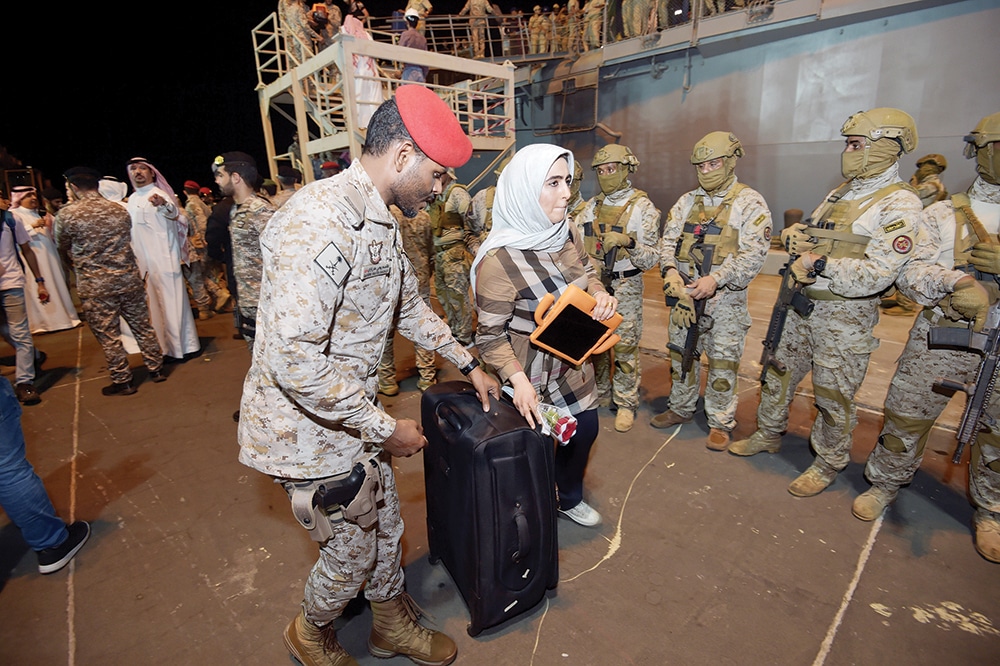KHARTOUM: A US-brokered ceasefire between Sudan’s warring generals was largely holding in much of the capital on Tuesday, but witnesses in some areas reported ongoing clashes between the army and paramilitary forces. Foreign nations stepped up efforts to evacuate their nationals from the chaos-torn nation, but security fears were compounded when the World Health Organization (WHO) warned of a "huge biological risk” after fighters occupied a Khartoum laboratory holding samples of cholera, measles, polio and other infectious diseases.
Ten days of heavy fighting until Monday — including air strikes and artillery barrages — have killed hundreds of people, many of them civilians, and left some neighborhoods of greater Khartoum in ruins. Bewildered civilians were seen walking down one street in Khartoum North where almost all buildings were bombed out and smoke was rising from scorched ruins, in unverified video posted on social media.
Witnesses in the same area later reported army air strikes and paramilitary forces shooting anti-aircraft missiles, and others in the capital’s twin city Omdurman reporting gunfire. Much of the city of five million had seen a reduction in fighting, witnesses said, since foreign governments have scrambled road convoys, aircraft and ships to get their nationals out since the weekend. Britain, which has thousands of citizens in Sudan, announced "a large-scale evacuation” from Tuesday, with Prime Minister Rishi Sunak saying "priority will be given to the most vulnerable”. Germany announced its last evacuation flight will take off Tuesday evening to Jordan. Little was known about the security situation in remote areas of the poverty-stricken nation, after Darfur in particular has seen heavy fighting in recent days and the looting of aid depots.
Thousands of Sudanese have tried to flee to Egypt, and the United Nations warned it was bracing for an exodus of up to 270,000 refugees to Sudan’s even poorer neighbors Chad and South Sudan. "Thankfully, we are safe,” Omdurman resident Salwa Soliman told AFP at the Egyptian border. "Neither the military nor the Rapid Support Forces (RSF) intercepted us” during a grueling 1,000-km journey, she said.
The fighting between the heavily armed paramilitary RSF and the army has killed at least 459 people and wounded more than 4,000 in the fierce fighting across Africa’s third-biggest country, according to UN agencies. More than 4,000 people have fled Sudan in foreign-organized evacuations that began on Saturday, including by sea to Saudi Arabia and by aircraft to Jordan and Cyprus. The army and the RSF agreed to the ceasefire "following intense negotiations”, US Secretary of State Antony Blinken said in a statement shortly before the truce took effect at midnight (2200 GMT Monday). Three previous bids to pause the conflict had failed to take hold, but both sides confirmed they had agreed to the three-day halt of armed hostilities. The RSF tweeted that "this ceasefire aims to establish humanitarian corridors, allowing citizens and residents to access essential resources, healthcare and safe zones, while also evacuating diplomatic missions”.
The army pledged it would abide by the ceasefire on condition its rivals did so, in a statement on Facebook. The European Union welcomed the announcement. "We urge both sides to fully uphold it,” its top diplomat Josep Borrell said. UN chief Antonio Guterres warned on Monday that Sudan was on "the edge of the abyss” and that the violence "could engulf the whole region and beyond”. Millions of Sudanese who are unable to flee are trying to survive acute shortages of water, food, medicine and fuel as well as power and internet blackouts.
The UN warned Tuesday that an estimated 219,000 women in Khartoum are pregnant, with "24,000 expected to give birth in the coming weeks”, amid a near-absence of medical care. The capital city has endured "more than a week of unspeakable destruction”, Norway’s ambassador Endre Stiansen wrote on Twitter after his evacuation. In an additional threat, the WHO’s representative in Sudan, Nima Saeed Abid, told reporters in Geneva via video-link that there was "a huge biological risk associated with the occupation of the central public health lab... by one of the fighting parties”.
The United States and European, Middle Eastern, African and Asian nations have launched emergency operations to bring to safety embassy staff and Sudan-based citizens. A UN convoy carrying 700 people on Monday completed an arduous 850-km road trip to Port Sudan on the Red Sea coast from the capital. The United Nations head of mission Volker Perthes, who is staying in Sudan, said the convoy arrived safely. French President Emmanuel Macron said that injuries sustained by a French soldier during the evacuation of 538 French and other foreign nationals in recent days were no longer life-threatening.
Sudan, one of the world’s poorest nations, has a troubled history of military coups. The latest conflict has pitted forces loyal to army chief Abdel Fattah Al-Burhan against those of his former deputy Mohamed Hamdan Daglo, who commands the RSF. The Forces of Freedom and Change — the main civilian bloc which the two generals ousted from power in a 2021 coup — voiced hope the truce would allow for "dialogue on the modalities of a permanent ceasefire”.
The RSF emerged from the Janjaweed militia that then-president Omar Al-Bashir unleashed in the Darfur region two decades ago, leading to war crimes charges against Bashir and others. The military toppled Bashir in April 2019 following mass citizen protests that raised hopes for a transition to democracy. The two generals seized power in the 2021 coup, but later fell out, most recently over the planned integration of the RSF into the regular army. Experts have long drawn links between the RSF and Russian mercenary group Wagner. Blinken earlier on Monday voiced "deep concern” that Wagner risked aggravating the war in Sudan. – AFP


